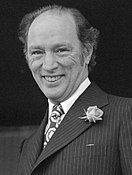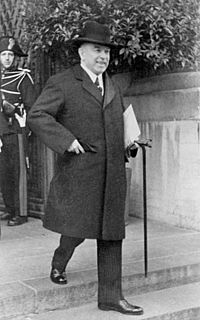| |||||||||||||||||||||||||||||||||||||||||||||||||||||||||||||||||||||||||||||
282 seats in the 32nd Canadian Parliament 142 seats needed for a majority | |||||||||||||||||||||||||||||||||||||||||||||||||||||||||||||||||||||||||||||
|---|---|---|---|---|---|---|---|---|---|---|---|---|---|---|---|---|---|---|---|---|---|---|---|---|---|---|---|---|---|---|---|---|---|---|---|---|---|---|---|---|---|---|---|---|---|---|---|---|---|---|---|---|---|---|---|---|---|---|---|---|---|---|---|---|---|---|---|---|---|---|---|---|---|---|---|---|---|
| Turnout | 69.3% [1] ( | ||||||||||||||||||||||||||||||||||||||||||||||||||||||||||||||||||||||||||||
| |||||||||||||||||||||||||||||||||||||||||||||||||||||||||||||||||||||||||||||
 Popular vote by province, with graphs indicating the number of seats won. As this is an FPTP election, seat totals are not determined by popular vote by province but instead via results by each riding. | |||||||||||||||||||||||||||||||||||||||||||||||||||||||||||||||||||||||||||||
| |||||||||||||||||||||||||||||||||||||||||||||||||||||||||||||||||||||||||||||
The Canadian federal election of 1980 was held on February 18, 1980, to elect members of the House of Commons of Canada of the 32nd Parliament of Canada. It was called when the minority Progressive Conservative government led by Prime Minister Joe Clark was defeated in the Commons.

The House of Commons of Canada is a component of the Parliament of Canada, along with the Sovereign and the Senate. The House of Commons currently meets in a temporary Commons chamber in the West Block of the parliament buildings on Parliament Hill in Ottawa, while the Centre Block, which houses the traditional Commons chamber, undergoes a ten-year renovation.

The 32nd Canadian Parliament was in session from April 14, 1980, until July 9, 1984. The membership was set by the 1980 federal election on February 18, 1980, and it only changed slightly due to resignations and by-elections prior to being dissolved before the 1984 election.

Canada is a country in the northern part of North America. Its ten provinces and three territories extend from the Atlantic to the Pacific and northward into the Arctic Ocean, covering 9.98 million square kilometres, making it the world's second-largest country by total area. Canada's southern border with the United States is the world's longest bi-national land border. Its capital is Ottawa, and its three largest metropolitan areas are Toronto, Montreal, and Vancouver. As a whole, Canada is sparsely populated, the majority of its land area being dominated by forest and tundra. Consequently, its population is highly urbanized, with over 80 percent of its inhabitants concentrated in large and medium-sized cities, many near the southern border. Canada's climate varies widely across its vast area, ranging from arctic weather in the north, to hot summers in the southern regions, with four distinct seasons.
Contents
- National results
- Vote and seat summaries
- Results by province
- Notes
- See also
- References
- External links
Clark and his government had been under attack for its perceived inexperience, for example, in its handling of its 1979 election campaign commitment to move Canada's embassy in Israel from Tel Aviv to Jerusalem. Clark had maintained uneasy relations with the fourth largest party in the House of Commons, Social Credit. While he needed the six votes that the conservative-populist Quebec-based party had in order to get legislation passed, he was unwilling to agree to the conditions they imposed for their support. Clark had managed to recruit one Social Credit MP, Richard Janelle, to join the PC caucus.

Israel, officially the State of Israel, is a country in Western Asia, located on the southeastern shore of the Mediterranean Sea and the northern shore of the Red Sea. It has land borders with Lebanon to the north, Syria to the northeast, Jordan on the east, the Palestinian territories of the West Bank and Gaza Strip to the east and west, respectively, and Egypt to the southwest. The country contains geographically diverse features within its relatively small area. Israel's economic and technological center is Tel Aviv, while its seat of government and proclaimed capital is Jerusalem, although the state's sovereignty over Jerusalem has only partial recognition.

Tel Aviv is the second most populous city in Israel—after Jerusalem—and the most populous city in the conurbation of Gush Dan, Israel's largest metropolitan area. Located on the country's Mediterranean coastline and with a population of 443,939, it is the economic and technological center of the country.

Jerusalem is a city in the Middle East, located on a plateau in the Judaean Mountains between the Mediterranean and the Dead Sea. It is one of the oldest cities in the world, and is considered holy to the three major Abrahamic religions—Judaism, Christianity, and Islam. Both Israel and the Palestinian Authority claim Jerusalem as their capital, as Israel maintains its primary governmental institutions there and the State of Palestine ultimately foresees it as its seat of power; however, neither claim is widely recognized internationally.
Clark's Minister of Finance, John Crosbie, introduced an austere government budget in late 1979 that proposed to increase the excise tax on gasoline by 18¢ per Imperial gallon (about 4¢ a litre) to reduce the federal government's deficit. The New Democratic Party's finance critic, Bob Rae, proposed a subamendment to the budget motion, stating that the House of Commons did not approve of the budget. [2] The five remaining Social Credit MPs abstained, upset that the revenues from the increased gas tax were not allocated to Quebec. In addition, one Tory MP was too ill to attend the vote while two others were abroad on official business. Meanwhile, the Liberals assembled all but one member of their caucus, even going as far as to bring in several bedridden MPs by ambulance. Rae's subamendment was adopted by a vote of 139–133, bringing down the government and forcing a new election.
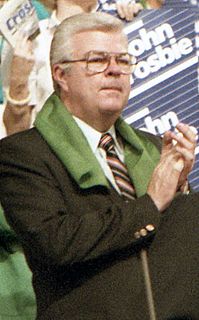
John Carnell Crosbie, is a retired provincial and federal politician who served as the 12th Lieutenant Governor of Newfoundland and Labrador, Canada. Crosbie has served as a provincial Cabinet minister under premiers Joey Smallwood and Frank Moores as well as a federal Cabinet minister during the governments of Joe Clark and Brian Mulroney.
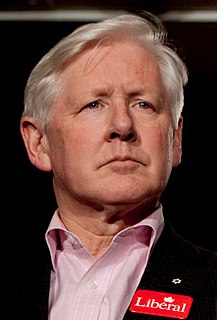
Robert Keith Rae, is a Canadian lawyer, negotiator, public speaker, and former politician. He was the member of Parliament for Toronto Centre and was the interim leader of the Liberal Party of Canada from 2011 to 2013. He was previously leader of the Ontario New Democratic Party and the 21st Premier of Ontario, from 1990 until 1995. Between 1978 and 2013, he was elected 11 times to federal and provincial parliaments.
Former Liberal prime minister Pierre Trudeau had announced his resignation as leader of the Liberal Party following its defeat in 1979. However, no leadership convention had been held when the Progressive Conservative government fell. Trudeau quickly rescinded his resignation and led the party to victory, winning 33 more seats than in the 1979 federal election. This enabled the Liberals to form a majority government.
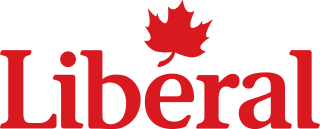
The Liberal Party of Canada is the oldest and longest-serving governing political party in Canada. The Liberals form the current government, elected in 2015. The party has dominated federal politics for much of Canada's history, holding power for almost 69 years in the 20th century—more than any other party in a developed country—and as a result, it is sometimes referred to as Canada's "natural governing party".

Joseph Philippe Pierre Yves Elliott Trudeau, often referred to by the initials PET, was a Canadian statesman who served as the 15th prime minister of Canada. He was the third longest-serving prime minister in Canadian history, having served for 15 years, 164 days.
Clark's Tories campaigned under the slogan, "Real change deserves a fair chance", but the voters were unwilling to give Clark another chance. The loss of the budget vote just seven months into his mandate and his subsequent defeat in the February 18 general election would eventually result in his ouster as leader by Brian Mulroney three years later.

Martin Brian Mulroney is a Canadian politician who served as the 18th prime minister of Canada from September 17, 1984, to June 25, 1993. His tenure as prime minister was marked by the introduction of major economic reforms, such as the Canada-U.S. Free Trade Agreement and the Goods and Services Tax, and the rejection of constitutional reforms such as the Meech Lake Accord and the Charlottetown Accord. Prior to his political career, he was a prominent lawyer and businessman in Montreal.
The Socreds' abstention on the crucial budget vote (while the Liberals and NDP voted to bring down the government) contributed to the growing perception that the party had become irrelevant following the death of iconic leader Réal Caouette. Social Credit lost all of its seats, never to return. The party rapidly declined into obscurity after this election, though it nominally continued to exist until 1993.

David Réal Caouette was a Canadian politician from Quebec. He was a Member of Parliament (MP) and leader of the Social Credit Party of Canada and founder of the Ralliement des créditistes. Outside politics he worked as a car dealer.
The new house was very regionally polarized. While the Liberals were shut out west of Manitoba, the Tories won only 14 seats east of Ontario (including only one in Quebec).
Voter turn-out was 69.3%. [3]
